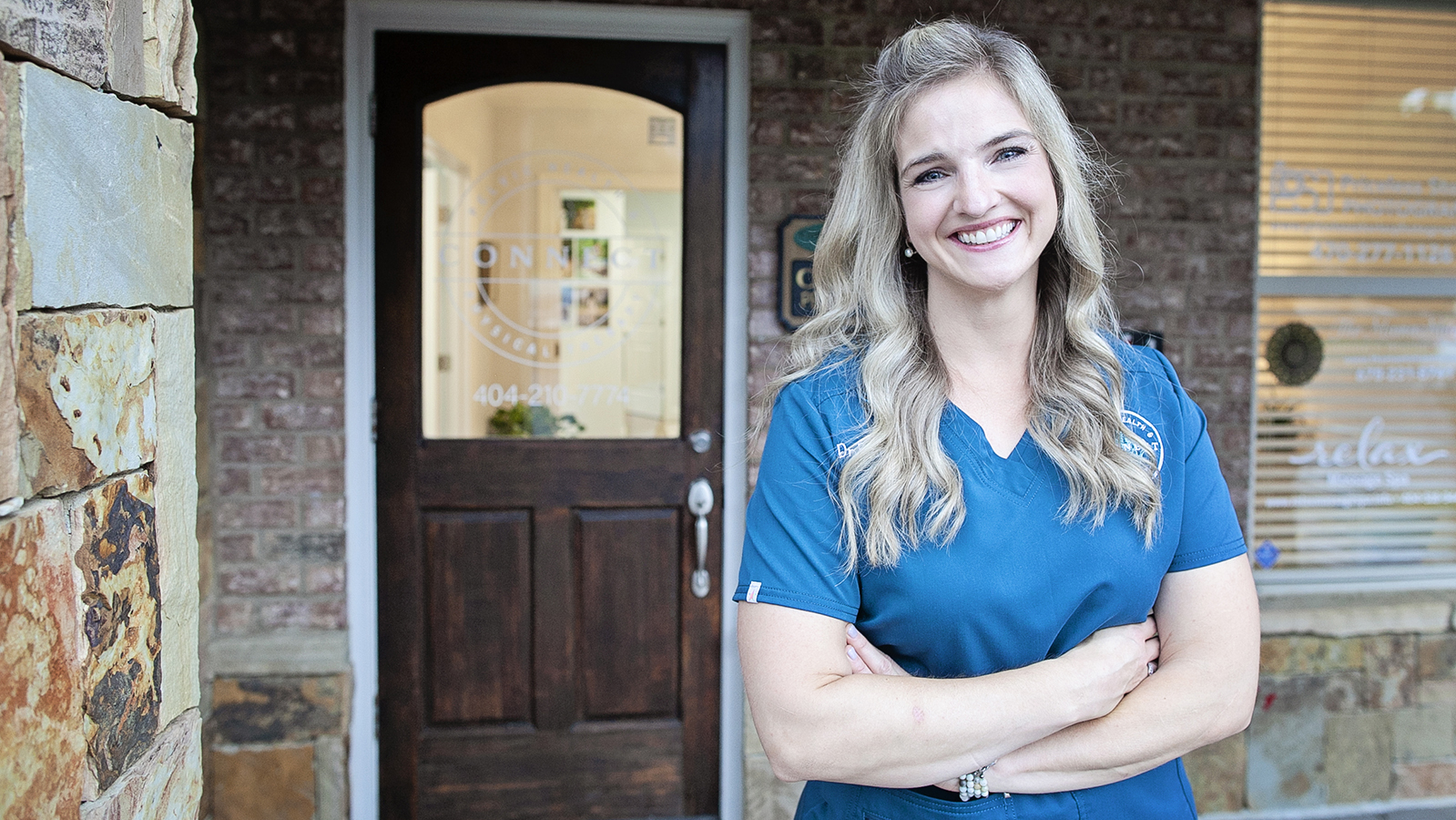Pursuing Her Dream
How an award-winning chemistry teacher dropped everything to become a pelvic physical therapist.

About nine years ago, Brandie Freeman, PT, DPT, MEd, APHC, had her youngest son. She needed pelvic physical therapy but had trouble getting to her appointments, as a chemistry teacher in northwest Georgia.
“I had to commute [one hour] to Atlanta and it was so, so hard to coordinate my care with childcare and my work schedule,” Dr. Freeman said. “If I didn’t have the layers of support that I have with my spouse and flexibility at work, I wouldn’t have been able to go.”
Yet something happened as she went to physical therapy. And it culminated in a clear indication of what she was meant to do.
“I had no idea that I would be called into this field,” Dr. Freeman said. “I loved teaching. I was actually the state science teacher of the year in Georgia, and I felt like God was using me in the classroom. But that seed was planted, and I was familiar with the physical therapy field.
“I had a dream—a literal dream—and I saw myself sitting on a therapist stool and there was a patient up on the treatment table. Their legs were covered up with the sheet you would do at pelvic physical therapy. They took their hand on my arm, and they were crying and telling me thank you.
“I quit my job and all the things that I had accomplished as an educator to be a pelvic floor therapist.”
Her next step was to find the right program. Dr. Freeman began by searching for not only the quickest path to becoming a pelvic physical therapist, but the best path in terms of preparation. The accelerated two-year format at Baylor University was a major asset on both fronts.
“Because I do have that commute into Atlanta, I knew that every day for three years I could commute over an hour to some of the schools inside of the city, and then two hours a day would be wasted driving,” she said. “Those would be times that I would be away from my children, that I wouldn’t be able to study.
“Then, with what I knew I wanted to do, pelvic health is presented in the Baylor curriculum, but it’s a broad scope of all the fields of physical therapy. I knew I had to do quite a bit of specialization training afterwards, so it made sense for me to go to a school where I could stay in my community. I didn’t have to move, and I didn’t have to commute.”
At Baylor, Dr. Freeman was able to learn remotely and then fly into Texas to get hands-on instruction from experts in the field. She considered the time that was saved extremely valuable for being with her family and making progress on her dream. And she maintained that singular career focus throughout the program, earning an A in every class.
“I wanted to make sure they knew that I wasn’t skimming over a neuro so I could be just a pelvic physical therapist,” she said. “There are patients with neurological conditions that come see me. The neuro classes I took at Baylor were excellent. People with pelvic floor issues, they have hip and back pain, and those classes that I took at Baylor, they were outstanding. I feel like I appreciate the fact that the professors—I don’t want to say, ‘put up with me’—but they supported me because I was the only one out of a hundred that just wanted to talk about pelvic floor physical therapy.”
Because of the flexibility she received in Baylor’s DPT program, Dr. Freeman took pelvic floor classes while she was in school. So when she graduated with her doctorate, she already had 300 hours of training in pelvic floor therapy. Then, she did her doctoral internships with leaders in the field of pelvic health in Colorado and Arizona, thanks to Baylor’s broad network of clinical sites.
“Within three months of graduating, I opened my own practice,” Dr. Freeman said. “Within a month, I had a full schedule. Then, two months later, I had a clinic.”
She founded the first pelvic health clinic in Paulding County, Georgia. At first, other business owners dissuaded her from opening one in a rural area. But she wanted to cater to people who can’t easily travel for pelvic pain—people just like her, nine years ago.
“If you could imagine living an hour away from Atlanta, and not only do you have a new baby to care for, you have to either transport your child an hour away in their car seat or arrange for childcare, but for a much longer period to be able to go out and take care of your own physical needs and any injuries or issues that you may have from your childbirth,” Dr. Freeman said. “Then, you’re adding that extra layer of accessibility.
“Also, there’s a large group of people that I see who have pelvic pain and it hurts to sit, and you’re having to drive an hour or 45 minutes or so to get care for that condition. You visit the physical therapist, they relieve your pain, but then you have to go sit for an hour and commute. That’s problematic, and it would certainly slow down people’s ability to get better.”
As Dr. Freeman looked back on everything, she thanked God for what He did along with Baylor for supporting her calling. Not even a year since graduation, she is the highest-rated pelvic floor therapist in Atlanta.
“I’ve already helped 350 different human beings from this rural area that wouldn’t have been able, and I’m actually more affordable and as far as cost efficiency to the patients too,” she said. “I’ve made this affordable, accessible outlet for care that a year ago did not exist.
“If I had been in another program, I would still be in school.”
